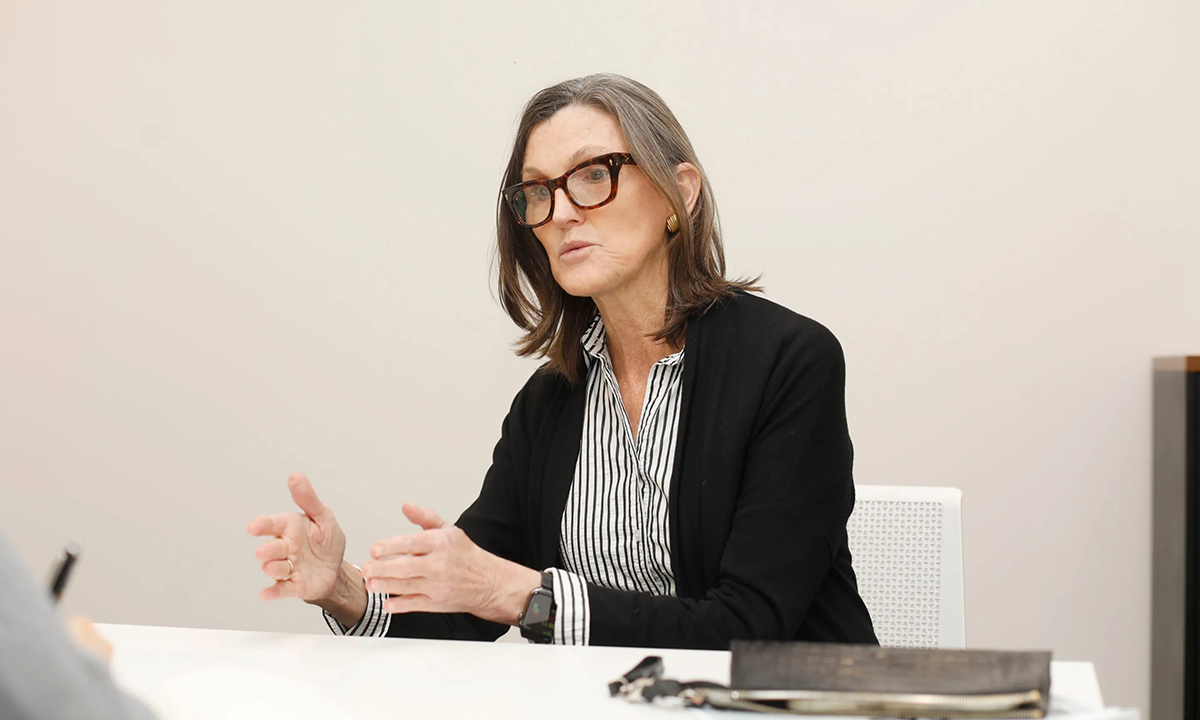
上周,凱茜·伍德密切關(guān)注市場(chǎng)并采取了行動(dòng):逢低買入。
伍德的方舟投資旗下的幾只交易所交易基金(以下簡(jiǎn)稱ETF)在大盤下跌的情況下買入了多只科技股。方舟投資管理著67億美元的資產(chǎn),是一家頗具影響力的公司,但其基金近期表現(xiàn)不佳。今年早些時(shí)候的報(bào)告顯示,由于基金業(yè)績(jī)不佳,投資者共從基金中撤資22億美元。
伍德希望能扭轉(zhuǎn)局面。上周,至少有兩只方舟投資的ETF買入了過去一個(gè)月股價(jià)暴跌的科技公司股票。以購(gòu)買當(dāng)日的開盤價(jià)計(jì)算,積極管理的方舟創(chuàng)新ETF購(gòu)買了亞馬遜(Amazon)、Advanced Micro Devices和Coinbase等公司價(jià)值約4500萬(wàn)美元的股票。以同樣的計(jì)算方式,該公司的方舟下一代互聯(lián)網(wǎng)基金買入了Meta、特斯拉(Tesla)和Robinhood公司950萬(wàn)美元的股票。這兩只基金還買入了其他股票。
所有這些公司都受到了整個(gè)市場(chǎng)大幅下跌的沖擊。然而,伍德是在低價(jià)買入股票,還是在市場(chǎng)開始崩潰時(shí)買入,還有待觀察。
金融科技投資平臺(tái)Prospero.ai首席執(zhí)行官喬治·凱拉斯(George Kailas)表示:"她可能是對(duì)的,也可能是錯(cuò)的。在過去幾年里,這兩種情況她都經(jīng)歷過。"
方舟投資拒絕置評(píng),而是讓《財(cái)富》雜志參考伍德討論近期市場(chǎng)走勢(shì)的一段視頻。
凱拉斯指的是方舟投資對(duì)特斯拉的押注,在2021年特斯拉股價(jià)上漲時(shí),該公司因此賺得盆滿缽滿。然而,自那以后,方舟投資的表現(xiàn)卻令人大失所望。投資于云計(jì)算相關(guān)互聯(lián)網(wǎng)公司的下一代互聯(lián)網(wǎng)基金今年迄今下跌了2%。與此同時(shí),方舟投資的旗艦基金創(chuàng)新ETF今年下跌了近20%。這兩只ETF均未達(dá)到2021年的高點(diǎn)。
科技股的暴跌與全球股市的拋售同時(shí)出現(xiàn),有人可能會(huì)認(rèn)為,科技股的暴跌引發(fā)了全球股市的拋售。8月2日,從日本到美國(guó)的股指均出現(xiàn)了單日大幅下跌。此后,日本的日經(jīng)指數(shù)和標(biāo)準(zhǔn)普爾500指數(shù)都略有反彈,但這并不足以消除一些投資者的擔(dān)憂,他們認(rèn)為這可能只是股價(jià)下跌的短暫復(fù)蘇。金融服務(wù)公司Cetera的首席投資官吉恩·戈德曼(Gene Goldman)表示:“我認(rèn)為這是死貓式反彈。”
戈德曼預(yù)測(cè),"標(biāo)準(zhǔn)普爾500指數(shù)從峰值到谷底的跌幅將達(dá)到10%或更多。”
凱拉斯表示認(rèn)同,但態(tài)度更為謹(jǐn)慎,他表示,如果必須為股市的走向做出選擇,那會(huì)是“稍微更看跌一些”。
有一群像伍德這樣的長(zhǎng)期成長(zhǎng)型投資者,將當(dāng)前的市場(chǎng)狀況視為機(jī)遇。瑞銀(UBS)在上周四發(fā)布的一份分析師報(bào)告中指出,許多科技公司即使在市場(chǎng)動(dòng)蕩的情況下仍狀況良好,這使得股價(jià)下跌的股票成為了“便宜貨”。
分析師寫道:"在我們看來,科技股的基本面依然穩(wěn)健,而估值如今已經(jīng)有所降低。”
瑞銀表示,預(yù)計(jì)全球科技行業(yè)第二季度的盈利同比增長(zhǎng)20%至25%。該銀行還預(yù)計(jì)在未來一年半內(nèi)持續(xù)盈利增長(zhǎng)15%至20%。
不過,即使是想要采取行動(dòng)的投資者也在謹(jǐn)慎行事。知名科技投資者、前投資組合經(jīng)理保羅·米克斯(Paul Meeks)表示:“我還沒有買入。即使我喜歡當(dāng)前的價(jià)格,但我不看好當(dāng)前的時(shí)機(jī)。”
在美國(guó),美聯(lián)儲(chǔ)在7月份的會(huì)議上決定推遲降息,這給投資者帶來了意想不到的打擊。市場(chǎng)已將9月降息視為板上釘釘?shù)氖隆H疸y仍然看好科技股,部分原因是其所謂的“技術(shù)因素”,這些因素更多地與宏觀經(jīng)濟(jì)有關(guān),而非個(gè)別公司自身。
對(duì)凱拉斯來說,還有其他大局因素令他擔(dān)憂——即美國(guó)大選。他說:"真正棘手的部分在于,我們看到的下跌,我認(rèn)為與政治和地緣政治問題有關(guān)。”
試圖預(yù)測(cè)任何選舉的結(jié)果都會(huì)讓投資者頭疼不已。然而,這一次,共和黨和民主黨都可能入主白宮,這可能為科技行業(yè)帶來不同的未來。米克斯說,兩個(gè)潛在的政府都沒有明確表示將推行何種科技監(jiān)管政策。
民主黨已表現(xiàn)出對(duì)大型科技公司進(jìn)行監(jiān)管的決心,這在很大程度上是前所未有的。另一方面,該黨的總統(tǒng)候選人、副總統(tǒng)卡瑪拉·哈里斯(Kamala Harris)與硅谷的一些重要人物關(guān)系密切。
與此同時(shí),共和黨候選人也存在不確定性。副總統(tǒng)候選人詹姆斯·戴維·萬(wàn)斯(JD Vance)曾是一名風(fēng)險(xiǎn)投資家,得到了彼得·蒂爾(Peter Thiel)等有影響力的科技界人士的支持。然而,前總統(tǒng)唐納德·特朗普(Donald Trump)提出對(duì)中國(guó)進(jìn)口商品征收全面關(guān)稅,這將對(duì)一些科技公司造成嚴(yán)重打擊,而且他建議臺(tái)灣向美國(guó)支付保護(hù)費(fèi),這已經(jīng)使一些股票大幅飆升。凱拉斯說:"尤其是在特朗普身上,我從未見他如此行事。”(財(cái)富中文網(wǎng))
譯者:中慧言-王芳
上周,凱茜·伍德密切關(guān)注市場(chǎng)并采取了行動(dòng):逢低買入。
伍德的方舟投資旗下的幾只交易所交易基金(以下簡(jiǎn)稱ETF)在大盤下跌的情況下買入了多只科技股。方舟投資管理著67億美元的資產(chǎn),是一家頗具影響力的公司,但其基金近期表現(xiàn)不佳。今年早些時(shí)候的報(bào)告顯示,由于基金業(yè)績(jī)不佳,投資者共從基金中撤資22億美元。
伍德希望能扭轉(zhuǎn)局面。上周,至少有兩只方舟投資的ETF買入了過去一個(gè)月股價(jià)暴跌的科技公司股票。以購(gòu)買當(dāng)日的開盤價(jià)計(jì)算,積極管理的方舟創(chuàng)新ETF購(gòu)買了亞馬遜(Amazon)、Advanced Micro Devices和Coinbase等公司價(jià)值約4500萬(wàn)美元的股票。以同樣的計(jì)算方式,該公司的方舟下一代互聯(lián)網(wǎng)基金買入了Meta、特斯拉(Tesla)和Robinhood公司950萬(wàn)美元的股票。這兩只基金還買入了其他股票。
所有這些公司都受到了整個(gè)市場(chǎng)大幅下跌的沖擊。然而,伍德是在低價(jià)買入股票,還是在市場(chǎng)開始崩潰時(shí)買入,還有待觀察。
金融科技投資平臺(tái)Prospero.ai首席執(zhí)行官喬治·凱拉斯(George Kailas)表示:"她可能是對(duì)的,也可能是錯(cuò)的。在過去幾年里,這兩種情況她都經(jīng)歷過。"
方舟投資拒絕置評(píng),而是讓《財(cái)富》雜志參考伍德討論近期市場(chǎng)走勢(shì)的一段視頻。
凱拉斯指的是方舟投資對(duì)特斯拉的押注,在2021年特斯拉股價(jià)上漲時(shí),該公司因此賺得盆滿缽滿。然而,自那以后,方舟投資的表現(xiàn)卻令人大失所望。投資于云計(jì)算相關(guān)互聯(lián)網(wǎng)公司的下一代互聯(lián)網(wǎng)基金今年迄今下跌了2%。與此同時(shí),方舟投資的旗艦基金創(chuàng)新ETF今年下跌了近20%。這兩只ETF均未達(dá)到2021年的高點(diǎn)。
科技股的暴跌與全球股市的拋售同時(shí)出現(xiàn),有人可能會(huì)認(rèn)為,科技股的暴跌引發(fā)了全球股市的拋售。8月2日,從日本到美國(guó)的股指均出現(xiàn)了單日大幅下跌。此后,日本的日經(jīng)指數(shù)和標(biāo)準(zhǔn)普爾500指數(shù)都略有反彈,但這并不足以消除一些投資者的擔(dān)憂,他們認(rèn)為這可能只是股價(jià)下跌的短暫復(fù)蘇。金融服務(wù)公司Cetera的首席投資官吉恩·戈德曼(Gene Goldman)表示:“我認(rèn)為這是死貓式反彈。”
戈德曼預(yù)測(cè),"標(biāo)準(zhǔn)普爾500指數(shù)從峰值到谷底的跌幅將達(dá)到10%或更多。”
凱拉斯表示認(rèn)同,但態(tài)度更為謹(jǐn)慎,他表示,如果必須為股市的走向做出選擇,那會(huì)是“稍微更看跌一些”。
有一群像伍德這樣的長(zhǎng)期成長(zhǎng)型投資者,將當(dāng)前的市場(chǎng)狀況視為機(jī)遇。瑞銀(UBS)在上周四發(fā)布的一份分析師報(bào)告中指出,許多科技公司即使在市場(chǎng)動(dòng)蕩的情況下仍狀況良好,這使得股價(jià)下跌的股票成為了“便宜貨”。
分析師寫道:"在我們看來,科技股的基本面依然穩(wěn)健,而估值如今已經(jīng)有所降低。”
瑞銀表示,預(yù)計(jì)全球科技行業(yè)第二季度的盈利同比增長(zhǎng)20%至25%。該銀行還預(yù)計(jì)在未來一年半內(nèi)持續(xù)盈利增長(zhǎng)15%至20%。
不過,即使是想要采取行動(dòng)的投資者也在謹(jǐn)慎行事。知名科技投資者、前投資組合經(jīng)理保羅·米克斯(Paul Meeks)表示:“我還沒有買入。即使我喜歡當(dāng)前的價(jià)格,但我不看好當(dāng)前的時(shí)機(jī)。”
在美國(guó),美聯(lián)儲(chǔ)在7月份的會(huì)議上決定推遲降息,這給投資者帶來了意想不到的打擊。市場(chǎng)已將9月降息視為板上釘釘?shù)氖隆H疸y仍然看好科技股,部分原因是其所謂的“技術(shù)因素”,這些因素更多地與宏觀經(jīng)濟(jì)有關(guān),而非個(gè)別公司自身。
對(duì)凱拉斯來說,還有其他大局因素令他擔(dān)憂——即美國(guó)大選。他說:"真正棘手的部分在于,我們看到的下跌,我認(rèn)為與政治和地緣政治問題有關(guān)。”
試圖預(yù)測(cè)任何選舉的結(jié)果都會(huì)讓投資者頭疼不已。然而,這一次,共和黨和民主黨都可能入主白宮,這可能為科技行業(yè)帶來不同的未來。米克斯說,兩個(gè)潛在的政府都沒有明確表示將推行何種科技監(jiān)管政策。
民主黨已表現(xiàn)出對(duì)大型科技公司進(jìn)行監(jiān)管的決心,這在很大程度上是前所未有的。另一方面,該黨的總統(tǒng)候選人、副總統(tǒng)卡瑪拉·哈里斯(Kamala Harris)與硅谷的一些重要人物關(guān)系密切。
與此同時(shí),共和黨候選人也存在不確定性。副總統(tǒng)候選人詹姆斯·戴維·萬(wàn)斯(JD Vance)曾是一名風(fēng)險(xiǎn)投資家,得到了彼得·蒂爾(Peter Thiel)等有影響力的科技界人士的支持。然而,前總統(tǒng)唐納德·特朗普(Donald Trump)提出對(duì)中國(guó)進(jìn)口商品征收全面關(guān)稅,這將對(duì)一些科技公司造成嚴(yán)重打擊,而且他建議臺(tái)灣向美國(guó)支付保護(hù)費(fèi),這已經(jīng)使一些股票大幅飆升。凱拉斯說:"尤其是在特朗普身上,我從未見他如此行事。”(財(cái)富中文網(wǎng))
譯者:中慧言-王芳
Cathie Wood eyed the market this week and made her move: She bought the dip.
Several ETFs at Wood’s firm, ARK Invest, bought a variety of tech stocks after they fell alongside a broader market drop. ARK Invest, which has $6.7 billion in assets under management, is an influential firm whose funds have fallen on hard times. Reports earlier this year showed investors pulled a total of $2.2 billion from the funds over their poor performance.
Wood is hoping to turn things around. This week, at least two ARK Invest ETFs bought shares in tech companies whose shares tumbled over the past month. The actively managed ARK Innovation ETF bought roughly $45 million worth of shares in companies like Amazon, Advanced Micro Devices, and Coinbase, based on the opening price on the day they were purchased. The firm’s ARK Next Generation Internet Fund bought $9.5 million of Meta, Tesla, and Robinhood shares, based on the same calculations. Both funds purchased other stocks as well.
All of those companies got caught up in the drastic rout that hit the entirety of the market. However, whether Woods is buying stocks at a bargain price or right as the market begins to crater remains to be seen.
“She could be right, she could be wrong,” says George Kailas, CEO of Prospero.ai, a fintech investment platform. “She’s definitely been both in the last couple years.”
ARK invest declined to comment and instead directed Fortune to a video where Wood discussed the recent market moves.
Kailas is referring to ARK Invest’s bet on Tesla, which netted the firm a fortune when its stock rallied in 2021. However, since then ARK Invest’s performance has been much more disappointing. The Next Generation Internet fund, which invests in cloud-related internet companies, is down 2% so far this year. Meanwhile the Innovation ETF, ARK Invest’s flagship fund, is down almost 20% for the year. Neither ETF has reached the heights they soared to in 2021.
The slump in tech stocks coincided with, or some might say led to, a global selloff across equities. On Friday, stock market indexes from Japan to the U.S. all had sharp single-day declines. Since then, both Japan’s Nikkei and the S&P 500 rebounded slightly, but not enough to assuage the fears of some investors that it might just be a short recovery of falling stock prices. “I feel it is a dead cat bounce,” said Gene Goldman, chief investment officer of financial services company Cetera.
Goldman predicts a “peak to trough fall in the S&P 500 of 10% or more.”
Kailas agreed, though more tentatively, saying if he had to pick a direction for the stock market it would be “a little more bearish.”
There are a group of long-term growth investors that, like Wood, view the current state of the market as an opportunity. Many tech companies remain in good shape, even if the market is tumultuous, making their cheapening stocks a bargain, UBS said in an analyst note published Thursday.
“Tech fundamentals remain solid, in our view, while valuations have now reset lower,” analysts wrote.
UBS said it estimated second-quarter earnings growth for the global tech sector would be 20% to 25% higher year over year. The bank also expected sustained earnings growth of 15% to 20% over the next year and a half.
Still, even investors who want to make a move are proceeding with caution. “I’m still not buying yet,” says prominent tech investor and former portfolio manager Paul Meeks. “Even though I love the price. I don’t like the timing.”
In the U.S., investors were hit with an unexpected blow when the Federal Reserve opted to hold off on interest rate cuts at its meeting in July. The markets are now treating a rate cut in September as a virtual certainty. UBS remains bullish on tech stocks in part because of what it called “technical factors” that have more to do with the macroeconomy than individual firms themselves.
For Kailas, there are other big-picture factors that worry him—namely the U.S. election. “Part of what’s really tough is we’re seeing dips that, I think, are related to political and geopolitical issues,” he said.
Trying to divine the outcome of any election can be headache-inducing for investors. However, this time around, both a possible Republican and Democratic White House could spell diverging futures for tech. Neither potential administration offers a clear picture of what sort of tech regulations it will pursue, Meeks said.
Democrats have shown a determination to regulate Big Tech that’s largely unprecedented. On the other hand, the party’s presidential nominee, Vice President Kamala Harris, has close ties to a few major figures from Silicon Valley.
Meanwhile the Republican ticket presents its own source of uncertainty. The vice presidential pick, JD Vance, is a former venture capitalist backed by influential tech names like Peter Thiel. However, former President Donald Trump has floated blanket tariffs on Chinese imports that would be crippling for some tech firms and already sent some stocks spiraling when he suggested Taiwan pay the U.S. for protection. “Especially with Trump I’ve never really seen behavior like this,” Kailas said.






